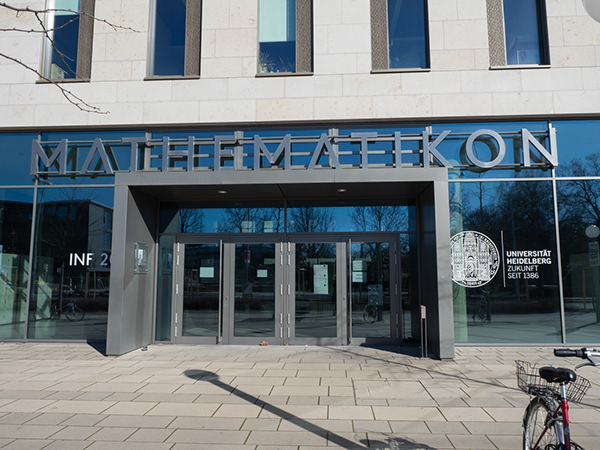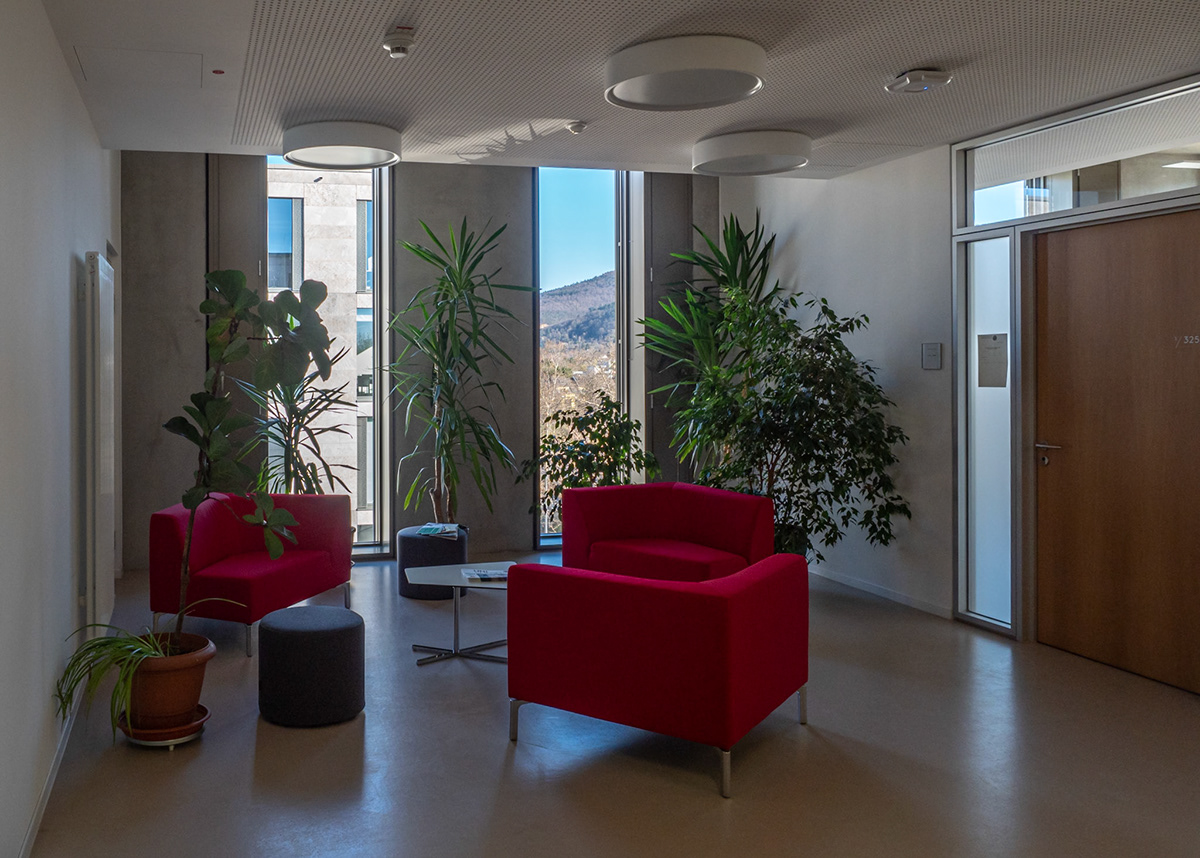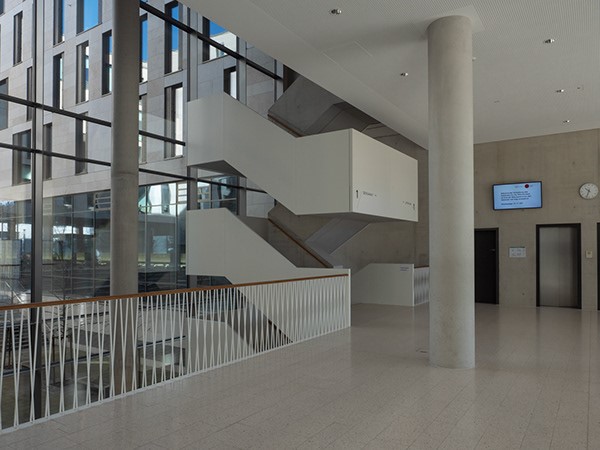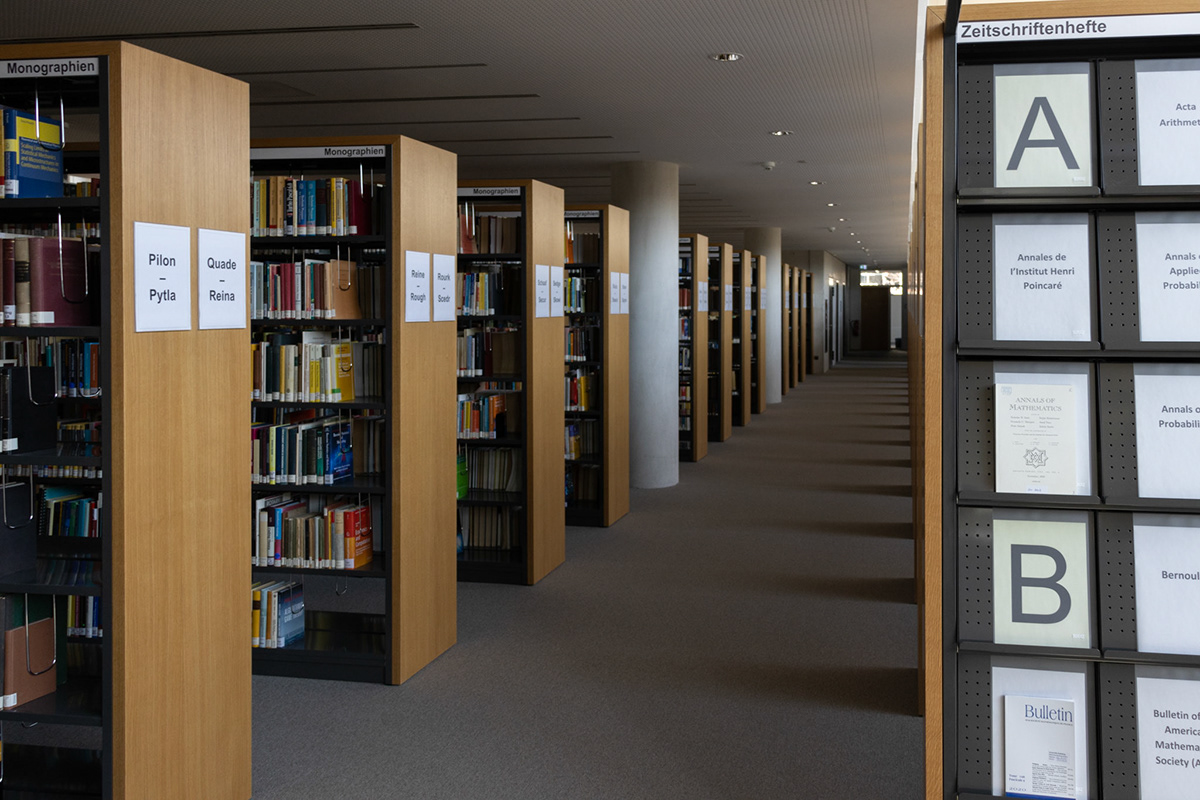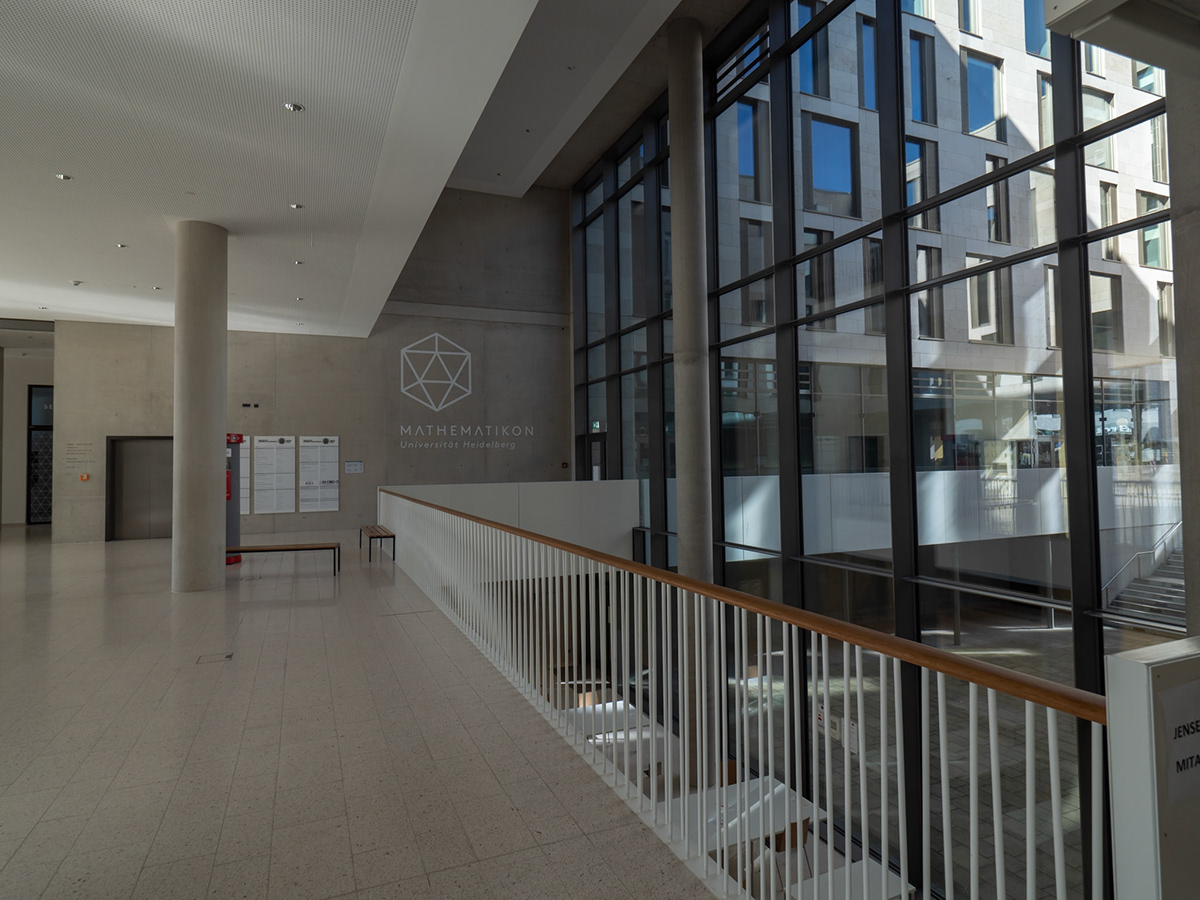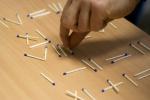
Student Vademecum
The following information is intended for bachelor students. Some of the organizational information is also relevant for students in the Master programs Mathematics, Computer Science or Scientific Computing.
Important Information
In the process of revising the faculty's website, the practical instructions on this page will be adapted to the dramatically changed framework conditions caused by the Covid pandemic. For the time being, of course, the content-related and formal instructions remain valid.
For Orientation
The student council MathPhysInfo usually organizes a two-week introduction (including a pre-course in mathematics). Detailed information about the content, location and time of the event can be found on the page of the MathPhysInfo student council. Experience has shown that the transition from school mathematics to a study program in Mathematics or Computer Science can cause some difficulty. Participation in the introductory course offered by the student council is strongly recommended to all students, as it smoothes the transition from school to university.
Abbreviations and Designations
You will come across some abbreviations and designations time and time again:
INF: A Heidelberg abbreviation: Im Neuenheimer Feld. The first digit of the building number usually indicates the building row, counting from Berliner Strasse. You will find the institutes of the faculty in the building rows 2 and 3. Directions and location map.
ct, st: "cum tempore", "sine tempore" for time indications. Courses usually start "with the academic quarter", for example at 9ct = 9:15 am. On the other hand, 9st = 9.00 a.m.
WS, SS: Winter semester, summer semester: The winter semester officially runs from October 1 to March 31, the summer semester from April 1 to September 30. The lecture period typically runs from mid-October to the end of January and from mid-April to the end of July. However, courses, and especially examinations, may also take place during the so-called "lecture-free period". Key dates and deadlines of the university.
Handy tips for your own work
We cannot stress the importance of the tutorials accompanying the lectures enough. The homework assignments to be worked on in writing are intended to deepen and improve your understanding of the lecture material. As a rule, these tasks are discussed in advance during the tutorials; however, the tutorial assistants (who are usually students of higher semesters) do not present you with a ready-made solution, but you should look for one yourself by contributing your own ideas and thus helping to shape the course of the tutorial. Sometimes it is required that you use only limited resources for finding the solution, e.g. that you only use results and concepts that have already been discussed in the lecture. Your written solutions will be reviewed and corrected by your tutorial assistants and then debriefed in the tutorial sessions. You may be asked to present your own solution yourself. Successful participation in the tutorials qualifies you for the respective module examinations. The criteria are determined by the respective lecturers. Mostly it is required
- that a certain percentage of the tasks is completed successfully,
- that you actively participate in the tutorial group,
- proof that you have mastered the lecture material (e.g. through in-class exercises).
You should tackle as many exercise tasks as possible. Working together with fellow students can be very inspiring. Try to work with others from the very beginning. If you run the risk of passively absorbing other people's ideas and actively contributing less yourself, then you should first work on the exercises alone and only then discuss your solution ideas with your fellow students.
Don't avoid trouble by simply copying solutions from others, whether only in idea or even by copying directly. However, if you do not make progress despite your own intensive work, don't isolate yourself with your difficulties, but discuss the lecture material with your fellow students and/or ask your tutorial assistant or your lecturer. Don't be afraid to ask a "stupid" question and reveal your uncertainty: Your fellow students may feel the same way, and lecturers and assistants know this from experience. Don't be afraid to offer justified criticism and don't be afraid to ask a question during a lecture or tutorial session if something seems unclear to you; there are no grades for participation at the university. However, experience has shown that active and intensive participation increases your learning progress.
You should take notes in every lecture. How detailed your notes should be depends very much on your own working style. If the instructor sticks closely to a book, to the lecture notes he or she publishes, or slides and other working materials provided, a few key words may suffice. Reference reading in books is important, but it is not enough. In any case, based on your notes or textbook reading, you should be able to thoroughly review the material from each session. This review is especially important in the field of mathematics. During the lecture, you will not always understand all the details right away; nor is this expected. Nevertheless, the instructor expects you to have worked through the material thoroughly by the next lecture session and to be familiar enough with it to be able to continue the lecture on this basis. The schedules assume that you will need about one hour of rework time per lecture hour. Whether you can get by with this depends on how you work. In any case, you should allow for at least this amount of work time in your weekly schedule, plus sufficient time to work on the exercises. This means that a schedule with 20 hours of lectures and tutorials per week fills a whole week.
It is beneficial to join forces with fellow students for a collaborative follow-up work in a working group. However, you should make sure that you have enough room for your own active participation in your working group; it is generally not sufficient to join an existing working group in order to only passively benefit from it. If you do not manage to complete all the work during the semester, make up the rest during the semester break.
Work Spaces
The following workspaces in the Neuenheimer Feld are accessible to you for working (during the respective opening hours):
- Faculty Library of Mathematics and Computer Science, INF 205
- Rooms in front of the seminar rooms in the Mathematikon, INF 205
- Lecture halls and seminar rooms in the Mathematikon, INF 205, (provided they are not occupied for courses or lectures)
- Reading hall of the University Library (UB), INF 368
Textbooks
Textbooks for lectures are recommended by the respective instructor. General recommendations for the respective modules can also be found in the module handbook of your degree program. These textbooks are available in sufficient numbers in the Faculty Library or in the textbook collection of the University Library. It is possible to borrow them from the University Library for a limited period of time. In some cases, there are inexpensive paperbacks that you may want to purchase. Before buying, you should look at the books in the library and get advice from your instructor or tutor.
Libraries
The libraries of the faculty (INF 205) and the university (INF 368) contain a wealth of study material at your disposal. You just need to know how to use it. Ask your tutors to explain to you how to use the Faculty Library. The University Library in the Neuenheimer Feld organizes guided tours for freshmen, which you should take advantage of. In addition, there is a virtual tour of the Im Neuenheimer Feld branch designed by the University Library.
Computer Pools
The Faculty of Mathematics and Computer Science has a computer pool in the basement of the Faculty Library of Mathematics and Computer Science (INF 205), accessible through the library. The opening hours are identical to the opening hours of the library. With your enrollment you automatically received an account at the University Computing Center (URZ). This allows you to use the computer pools of the URZ and other computer pools.
General advice on beginning a course of study in mathematics
Working in mathematics can be fun, even as a beginner: Whether you examine a series for convergence, calculate an integral (in your head, not by pressing a button ;)), find a small proof or a counterexample to a conjecture yourself, or solve a system of linear equations or a differential equation - if the task was sufficiently difficult for you and you were able to solve it on your own, you will experience joy at this kind of success.
Don't let anything or anyone spoil this fun! This way, studying mathematics will help you - almost regardless of the content - gain a key methodological qualification, on the basis of which you will be offered excellent career opportunities both in classical occupational fields and in typical new occupational fields at the present time.
Beginners' mathematics lectures should actually be an exciting experience for students through giving insights into the development of mathematics since Pythagoras and Euclid, over Leibniz and Newton to modern questions and today's research, and through highlighting the role of mathematics in intellectual history and its importance for us today. Sometimes they succeed at least partially in achieving this ideal teaching goal.
Often, however, the difficulties in detail outweigh for beginners. If you have taken an advanced course in mathematics, you will find some of the school material here again in a more in-depth form; this will make it easier for you to overcome the initial difficulties. Some of you who have enjoyed particularly good teaching at school may even get the initial impression of not being offered anything new. In that case, don't become impatient and miss the moment, which will probably come soon, when the lecture material goes beyond your previous knowledge.
Many times it will also be the case that you have already heard of certain mathematical terms and facts at school, but that they are covered in more detail and more thoroughly here. Mathematics, as you will encounter it here at the university, can only be compared to school mathematics to a limited extent. It is characterized by:
- the axiomatic structure,
- the precise mathematical language and
- the high level of abstraction.
The axiomatic-deductive structure and the use of abstract conceptualizations are not indispensable in the basic lectures, but they have become common today. This way of thinking has arisen in the solution of the great classical problems of mathematics, and it has proved itself in the endeavor to make the developed theories valid and applicable in as large a field as possible. In school, a consistent axiomatic presentation of mathematics is not possible for didactic reasons. Therefore, at university, a longer period of familiarization is usually necessary for you to get used to it. At this point, it should not go unmentioned that there are also dangers if you are confronted exclusively with ready-made theories in an axiomatic-deductive structure in the early semesters. The danger is that you do not recognize the original problems from which these theories have developed and that you misunderstand the theory presented to you as an end in itself and as the actual content of mathematical research. Unfortunately, such misunderstanding is not uncommon today and is even beginning to have an impact on curricula and textbooks. Do not be impressed by this; always look for the motivation and historical background of the theory offered to you in the lecture and ask the instructors about it as well. An elegant theory is always only an end state in a development prompted by definite problems.
For some, the transition from the classroom to the introductory mathematics lecture can come as a shock that is difficult to overcome. School teaching is often still geared toward computational techniques and procedures. At university, however, the focus shifts towards the analysis of abstract structures and principles. This requires readjustment. Lack of prior knowledge from school may be partly responsible for adjustment difficulties. While our basic lectures are generally structured in such a way that no prior knowledge is required in a formal sense, the assumption is, however, that you are sufficiently familiar with mathematical objects and methods taught in school. This is reflected in the manner of presentation and in the speed of the procedure. For this reason, good knowledge of school mathematics and skills acquired in school are very useful.
There is no one-fits-all solution for overcoming the initial difficulties. In any case, it can be said that the successful completion of a study program in mathematics requires (a certain specific) talent, genuine interest, and the willingness to work persistently and with concentration. If at least one of these requirements is not met, studying mathematics will sooner or later become a difficult burden or disappointment to bear.
At this point, we would once again like to point out the importance of attending the mathematics pre-course offered by the student council.
Changing study programs
We speak of a change of study program if you change from the bachelor study program 100% to the bachelor study program 50% within mathematics, or vice versa. In terms of content, the two courses of study in the field of mathematics run parallel to a considerable extent, so that from this point of view a change of course of study is possible even after several semesters without significant loss of time. Please note, however, that you will need at least a second field of study for the 50% bachelor's degree. Also, in the bachelor program you will study a so-called area of application and not every field is equally suitable as a major and minor subject. Furthermore, the BAFöG regulations must also be taken into account in the case of a change of study program. It is possible that you may not be eligible for funding. You should therefore check with the BAFöG office in good time. However, a change of subject may also be the right decision for you. You can also consult the Central Student Advisory Service. (When changing your field of study, pay attention to the BAFöG regulations if you receive financial aid.)
Heidelberg University Course Catalogue
The course catalog contains important information, e.g. about your "status" as a student and the associated obligations and formalities. Furthermore, it contains all relevant addresses (of institutes, seminars, etc.) and telephone numbers. You can find the course catalog and the personnel and information catalog in the LSF of Heidelberg University. Advance information about the upcoming semester's teaching can also be found on the pinboard of the faculty homepage.
Student Advisory Services
The Faculty Student Advisory Service is available to all students. Please make use of this service. With the support of the student advisor, individual difficulties in particular can be analyzed and solutions or ways out can be found. In addition, every instructor of the Faculty of Mathematics and Computer Science is at your disposal for individual counseling. Don't be afraid to ask the instructor of your beginner's lecture your questions during the breaks and after the lecture, even outside the official office hours if he or she is not available at the moment.
Student Council
University Center for Student Advisory Services and Secondary Education
For general questions about your studies, such as changing your major, exam stress and study organization, please contact the Central Student Advisory Service at Heidelberg University.
Seminarstraße 2
Tel: 06221 54-5454
In addition to workshops and lectures, the Central Student Advisory Service also offers individual counseling.
Service portal for students of the university
This is for example used for registration for the coming semesters.
Seminarstrasse 2, Room 036
Phone: +49 6221 54-5454
This phone number leads to a telephone portal with advice on all formal questions concerning your studies.
Libraries
The Faculty Library of Mathematics and Computer Science is located on the first floor of the Mathematikon, Im Neuenheimer Feld 205. It is a reference library from which you cannot borrow books. There are also (limited) workspaces in the library. You can, however, borrow textbooks for a limited time from the textbook collection of the central university library, Im Neuenheimer Feld 368. There are also workspaces in the reading hall of the University Library.
Zentralmensa
The Zentralmensa
with cafeteria is located in the building Im Neuenheimer Feld 304.


